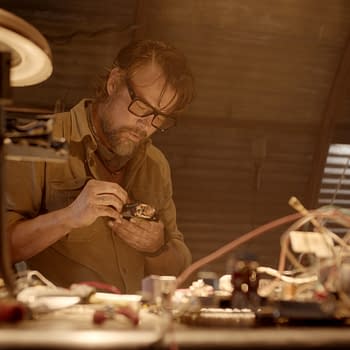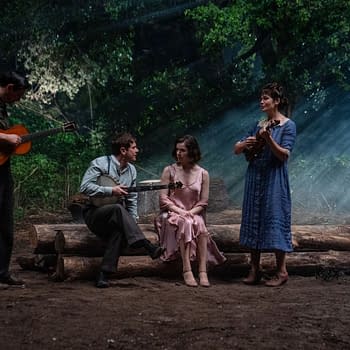Posted in: Movies | Tagged: Andrew Serkis, dawn of the planet of the apes, entertainment, film, John Chambers, matt reeves, planet of the apes, star wars
Dawn Of The Planet Of The Apes Director Matt Reeves On Violence, Endpoints, And Crediting Motion Capture Performance
By Patrick Dane
Dawn of the Planet of the Apes is a really interesting film to pick apart. There is clearly a lot going on under the hood, what with it tackling broad subjects like war, society and human nature in ways that go beyond what we would commonly expect of a summer tent-pole. I quite enjoyed it, as you might have seen.
That is why I had a great time talking the film's Director Matt Reeves. Reeves was already crafting a distinct voice in Hollywood and Dawn will likely garner him a whole bunch of new fans too. His new movie is a thoughtful and considerate effort, so it should be no surprise that he was a thoughtful and considerate interviewee when I got the chance to catch up with him this week.
These are full answers, some over 500 words each. Stick with them. They are full of insight into Dawn of the Planet of the Apes. Within, Reeves talks about some of the bigger ideas in the movie, how it doesn't matter that Planet of the Apes is the inevitable end point of the franchise and he lays out his position on the debate of who gets credit for performance capture roles.
There are a few minor spoilers involved, but nothing too big. If you'd like to go in totally clean however, come catch us after you catch the movie.
Patrick Dane: The last few films you've worked on involved creatures and scif-fi./horror conceits. Was that entirely deliberate?
Matt Reeves: It's interesting because in the specific case of the Planet of the Apes, it is a world and a franchise that I was obsessed with as a kid. I was specifically obsessed with the apes. I wanted to be an ape. I thought the way they looked was amazing, and this guy who did the make up, his name was John Chambers and he did this… I thought that that make up was, I still think that that make up was amazing. So there was something about looking at those apes and they were terrifying and they were thrilling, there was something kind of instinctual. Weirdly, to look at the apes was to look at ourselves. So in the case of The Planet of the Apes, I was really drawn to that as a science fiction metaphor for the way that really exploring the apes, y'know, if you are going to explore their nature, you are going to explore our nature.
The irony is, the truth is, the last three things I've done have been, I guess have been creature orientated. It interestingly was not and has not been my fascination. What it is, what I have discovered and it is very exciting…and I always loved these kinds of movies. Planet of the Apes was my Star Wars before Star Wars was my Star Wars. That story and that world were so compelling and the fantasy was terrifying but also in ways I'd only later realise, was very exciting to me. But I can't even say that that storytelling aside from Star Wars to Planet of the Apes or later films like Alien or The Thing, these are movies I love.
But it wasn't necessarily my desire to get into genre, until I got into genre. Then when I got into genre I realised that, especially now, where to do story about the real world is a very hard thing to get a studio let you do. To do something that is about character and its about human nature, the idea of doing that in a blockbuster is very rare. That is why I was particularly excited about this story because I thought that, besides the crazy fantasy that they are intelligent apes, it is really a drama. It's got spectacle, it's got all the things you want from a summer tent-pole movie, but it is much more weighted to character interaction and toward a kind of examination on some level of human nature, then you would get on this kind of size and scale. So that is a kind of opportunity. That was irresistible.
So that is something I have discovered in genre and doing genre films, is that it is one of the few areas where it is acceptable to do a story and smuggle in something that actually is personal. So weirdly, I would say these last 3 films have been personal to me but they just happen to be using creatures and genre in order to be the…surface.
PD: There is a scene in the film where a conflict occurs with some rather striking imagery reminiscent of middle eastern warfare. Would you say that was an entirely deliberate decision?
MR: Well, I mean, it is interesting. Somebody asked me that as well, which is the idea that some of the real world tensions, are they being directly reflected in the film or not? I will say, there wasn't any intention to directly reflect any one conflict.
It was more that there was an opportunity here to…because you know it becomes Planet of the Apes, this was the opportunity. I thought, when I came in and pitched the story that I wanted to tell, I said "this seems to me the moment where this could have been different. Where peace could have happened and it doesn't happen".
What I thought was exciting, was someone once asked me whether I thought that because we know the ending of the story, does that make the story boring? You already know where it is going, so what is the point? I actually thought that was the most exciting part because when a story stops being about what happens and starts becoming how do you get from here to there, the getting from here to there is all about how and why. That is character and human nature. Or…ape nature.
So I realised this was going to be an anatomy of violence because I thought, well if this is the moment where it could have been, and we see all the ways in which it could have worked out, but you also see all the ways it is pulling inexorably towards violence, it becomes about our inability to avoid violence or our struggle with violence. So all of that has relevance, deliberately so, to real world context but not even necessarily just to today. Hopefully, it is something that is a little more timeless than that.
We were definitely aware of the parallels, but it is not like we set out like "this is the perfect opportunity to do the Israeli/Palestine conflict" or something. We didn't really set out to do anything that directly, but we knew those resonances, that if we made the story feel like it was…I don't know…authentic, it might resonate through. Actually we were hoping that would happen, but there is no direct parallel to anything real world that is borrowed in a way that the audience will get. We are hoping that people will make their own connections.
PD: Going forward, do you think that the themes of ambiguity in warfare will define the entire franchise?
MR: What was really important to me was that there would be no villains in this story. That the story would be one in how all the points of views have been arrived at. That is why I describe it as an anatomy of violence because you are looking at it and you go like, "well, you can understand if you were any of those characters why they might do this and why this problem becomes very hard to grapple with." That was a thing that I thought was a great test for Caesar, because Caesar is going to be a seminal figure in history, he has to go from being a revolutionary to a… because in the last movie, it is kind of stacked against the humans. The apes have been treated so poorly, that by the time they have that conflict on the golden gate bridge, you have no ambiguity about the rooting interest.
I wanted there to be ambiguity in this story. I wanted this to be a loss of innocence for the apes too. I wanted them too…because Blue Eyes, Caesar's son, he has a kind of romanticisation of the idea of being a warrior. So the idea of him being thrust into conflict and having to really see first hand what that conflict is and having to see people die or apes die, that then would remove that sense of black and white depictions of conflict. So I hope it does.
That is the thing, in the next story, Caesar, without getting spoilery obviously for people who haven't seen the movie, it reaches a place where Caesar is pushed even further into a world, which of course we knew was going to happen because of what Planet of the Apes becomes, into a world that he doesn't really want to exist. One of the things I talked about with Andy [Serkis] is, Andy when he was playing Caesar in the first film, he said the way he played it was that he (Caesar) felt he was human and then only realised at a point that he was different and that turned him into an outsider. Then he had this outsiderness with the apes because he realised he wasn't purely ape either because he had been raised as a human essentially. So he is an interesting character in the history of this conflict in that he has the potential for empathy for both sides.
So now he is thrust out of self preservation, but more than self preservation, preservation of his family, of his species, through conflict that he doesn't really want. So how is he going to manage that? So I thought, that would be an ongoing story about him becoming a very seminal figure in this history… mythic figure! Mythic figure!
PD: Of course, I actually responded to the scene that humanises Koba, where he talks about "human work".
MR: Oh yeah! That is the thing. For the first third of the movie. I wanted them to be presented as brothers. There is actually a scene that we ended up cutting out where they were even closer but because of the narrative, it was too many beats of the same thing. I was like "oh, shoot we have to lose it". It literally had them arm in arm. It was the first time you'd hear Andy speak in the movie. He said "Apes, together, strong", so it mirrors that moment later and so it was really important to me, and I thought Toby (Kebell, who played Koba) did this brilliantly, that you not only empathise, but you sympathise with him, especially in those early moments. When he is talking about what he has been through, that "human work" scene, when he comes to Caesar and pledges his allegiance to him, he means it. He is saying, "You freed me from bondage, from what they did to me and I will never forget that."
Then you start to realise, in fact the idea was, that if the humans had not still been there that the apes, the question is can the apes become something that humanity couldn't become? Which is a species that doesn't destroy itself. That idea is one of the things you will never know because the feeling is that their brotherhood would have continued, that this family would have built and who knows what they could have become if humans hadn't shown up and revealed all the fault lines of the history of the apes. Caesar has history that the other apes don't share and you can see where all these conflicts come up. But yeah, the idea was definitely to empathise.
PD: I know online there has been a raging debate about performance capture and how much of Caesar is Andy Serkis and how much is that of the animators of WETA?
MR: Well my… the thing about it is, when I first came on, I was a little worried because I had never done performance capture before. To me as a director, one of the most important things I engage in is my relationship with the actors. So staging the scene and trying to find that authentic emotion of the scene is all about just working with actors. So I thought, is mo-cap going to be an obstacle to that? Is it a technical thing? And one of the things I asked to do was to see all of Andy's performance without it having been translated to Caesar yet. So I looked at Andy as Andy.
I was so affected by Caesar in Rise. Especially that scene where he is in the habitat and he is banging on the glass. So emotional right? So then I saw that scene as Andy, without him being Caesar, and I was as affected, if not more affected. I was like "Oh, this is a huge relief. The reason Andy is great in this scene is because Andy is great and somehow WETA have managed to turn him into an ape. That is insane."
Now having done the movie, I can say, that the way I come down on it is that it is two arts living side by side to create that performance. One is the performance. So if you are affected by the emotion of Caesar, what you are affected by is Andy. Andy is one of the best actors I've ever worked with. That was the big revelation for me. I was like, "Oh, basically the secret is that he is great!" But the other side of it is that his anatomy isn't the same as Caesar's and how you translate that…there is no button pushing. What it is is it's literal artistic translation. This was one of the things we were talking about in post.
I would constantly bring back the shots of Andy and compare them to the animation and say, "Hey guys, doesn't Andy look not just like his eyes are sad like the way you have here, but they also look angry and sad. Then they would analyse that and they would say, "Oh yeah, there is this shape in his lid. There is a tension here that has a little bit of anger, but also you can see the sadness in his eyes from the redness in his eyes and the vulnerability." So there was this constant, sort of search to reproduce his performance, but do it in a way that was completely artistic.
That is just for the mining of emotion. Then there is the fur simulation and all the stuff that they do which is insane. Caesar doesn't exist without either of them but from a performance point of view, people say, "well if his performance is that great, should he be nominated in the Oscars for best performance by an actor or should there be a special category? Now I think people will come out with what they think would be the right answer to this, but my idea is that I think both categories that apply already exist and that is, if you are really responding to that performance, then you are really responding to Andy and that is him as an actor. If you are responding to Caesar as well, then that means the other part of it, the best visual effects you've ever seen, and that category already exists, then that is what WETA deserves. So to me, there are two awards here that apply to Caesar. One would have to do with performance and the other would have to do with special effects and both of them are the magic that create Caesar.
As I was leaving the room and thanking Reeves, I received a little bit of exciting news about potential release versions. The exchange followed as:
PD: I'd love to see the cut without the visual effects.
MR: That is the thing, you work on the movie, it takes so long to create an ape shot, that the version of the movie that we look at for the the whole year that you are editing, didn't have any effects on it.
PD: As I said, I'd love to see it!
MR: I think we might do that, put out a version, or at least part of it.
PD: I wasn't saying that flippantly. I would genuinely be very excited about seeing a cut of just actors. Seeing that raw performance is going to be important to understanding the process of the film that has been made. Here's hoping we see as much as possible.
Patrick Dane, once a would be filmmaker, has somewhat accidentally found himself as an entertainment journalist over the past two years. You may recognize him from around these parts, or you may not. Who's counting? From E3 to SDCC to the Top Gear track, Patrick has explored the world of entertainment wherever it has taken him. He is always happy to talk words at you. Hopefully the ones above will suffice your needs.



















